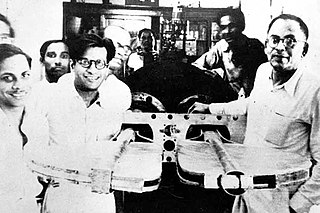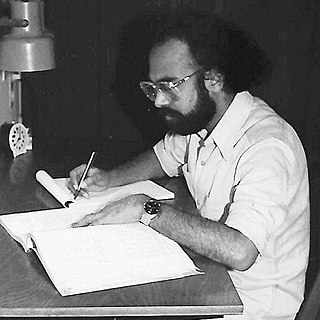
Satyendra Nath Bose was an Indian mathematician and physicist specializing in theoretical physics. He is best known for his work on quantum mechanics in the early 1920s, in developing the foundation for Bose statistics and the theory of the Bose condensate. A Fellow of the Royal Society, he was awarded India's second highest civilian award, the Padma Vibhushan, in 1954 by the Government of India.

Ashoke Sen FRS is an Indian theoretical physicist and distinguished professor at the Harish-Chandra Research Institute, Allahabad. He is also an honorary fellow in National Institute of Science Education and Research (NISER), Bhubaneswar, India and also a Morningstar Visiting professor at MIT and a distinguished professor at the Korea Institute for Advanced Study. His main area of work is string theory. He was among the first recipients of the Fundamental Physics Prize "for opening the path to the realisation that all string theories are different limits of the same underlying theory".

Meghnad Saha was an Indian astrophysicist who developed the Saha ionization equation, used to describe chemical and physical conditions in stars. His work allowed astronomers to accurately relate the spectral classes of stars to their actual temperatures. He was elected to the Parliament of India in 1952 from Kolkata.

Tata Institute of Fundamental Research (TIFR) is a public deemed research university located in Mumbai, India that is dedicated to basic research in mathematics and the sciences. It is a Deemed University and works under the umbrella of the Department of Atomic Energy of the Government of India. It is located at Navy Nagar, Colaba, Mumbai, with an affiliated campus in Serilingampally near Hyderabad. TIFR conducts research primarily in the natural sciences, mathematics, the biological sciences and theoretical computer science.
The Jawaharlal Nehru Centre for Advanced Scientific Research (JNCASR) is a multidisciplinary research institute located at Jakkur, Bangalore, India. It was established by the Department of Science and Technology of the Government of India, to mark the birth centenary of Pandit Jawaharlal Nehru, the first prime minister of independent India.

The Saha Institute of Nuclear Physics (SINP) is an institution of basic research and training in physical and biophysical sciences located in Bidhannagar, Kolkata, India. The institute is named after the famous Indian physicist Meghnad Saha.
Nuclear power is the fifth-largest source of electricity in India after coal, gas, hydroelectricity and wind power. As of November 2020, India has 22 nuclear reactors in operation in 7 nuclear power plants, with a total installed capacity of 7,380 MW. Nuclear power produced a total of 43 TWh in 2020-21, contributing 3.11% of total power generation in India. 10 more reactors are under construction with a combined generation capacity of 8,000 MW.

Bikash Sinha is an Indian physicist, active in the fields of nuclear physics and high energy physics. Bikash Sinha was the director of the Saha Institute of Nuclear Physics and Variable Energy Cyclotron Centre and the chairman of the Board of Governors of the National Institute of Technology, Durgapur in June 2005. He retired from service as the director of Variable Energy Cyclotron Centre and the Saha Institute of Nuclear Physics in June 2009. Presently he is the Homi Bhabha Chair Professor of the Variable Energy Cyclotron Centre. He is also a member of scientific advisory board to the Prime Minister of India. He received Padma Shri in 2001 and Padma Bhushan in 2010.
Palashipara Assembly constituency is an assembly constituency in Nadia district in the Indian state of West Bengal.

Birla Institute of Technology & Science, Pilani is a private deemed university in Pilani, India. It focuses primarily on higher education and research in engineering and sciences. After expansion to a campus in Dubai, it has become the first international deemed university, spearheading in science, engineering, management and research with 5 established campuses and 15 academic departments.

Basanti Dulal Nagchaudhuri was an Indian physicist and academic, and a scientific advisor to the Government of India. He is known as one of the pioneers of nuclear physics in India and for building the nation's first cyclotron at the University of Calcutta.

Sainik School, Purulia is a Sainik School established by the Sainik Schools Society in 1962, at Purulia, near Manguria in Purulia district, West Bengal India. The school prepares its students for the officers cadre in the Armed Forces and for other professions.
Palle Rama Rao FREng is an Indian scientist noted for his contribution to the field of Physical and Mechanical Metallurgy. He has collaborated and conducted research activities for over dozen universities and associations all over India and abroad. He has been honoured with the titles of Padma Vibhushan in 2011 by president of India for his contributions to scientific community. He is acting as the chairman, Governing Council, International Advanced Research Centre for Powder Metallurgy & New Materials (ARCI), Hyderabad.
Kerala Science Congress is an annual gathering of Kerala-based scientists and scholars organised by Kerala State Council for Science, Technology and Environment (KSCSTE) for revitalizing Research and Development activities in Kerala and to identify new talents in scientific research in Kerala. KSCSTE is an autonomous body constituted by the Government of Kerala. The gathering features talks by invited scientists, presentations of research papers and awards of various prizes.

Indian Association for the Cultivation of Science (IACS) is a public, deemed, research university for higher education and research in basic sciences under the Department of Science & Technology, Government of India, situated at the heart of the Cultural capital of India. Established in 1876 by Mahendralal Sarkar, a private medical practitioner, it focuses on fundamental research in basic sciences. It is Asia's oldest research institute Located at Jadavpur, South Kolkata near Jadavpur University, Central Glass and Ceramic Research Institute and Indian Institute of Chemical Biology. It is spread over a limited area of 9.5 acres and currently in the process of building a super-advanced SMART campus at Baruipur.

Ajay Kumar Sood is an Indian physicist, researcher and is serving as the 4th Principal Scientific Adviser to the Government of India. He is also holder of 2 US and 5 Indian patents, known for his pioneering research findings on graphene and nanotechnology. He is a Distinguished Honorary Professor of Physics at Indian Institute of Science, Bangalore. The Government of India honoured him in 2013, with the Padma Shri, the fourth highest civilian award, for his contributions to the fields of science and technology. Sood was elected a Fellow of the Royal Society (FRS) in 2015. He has been on the Physical Sciences jury for the Infosys Prize from 2019.

Chanchal Kumar Majumdar was an Indian condensed matter physicist and the founder director of S.N. Bose National Centre for Basic Sciences. Known for his research in quantum mechanics, Majumdar was an elected fellow of all the three major Indian science academies – the Indian National Science Academy, the National Academy of Sciences, India, and the Indian Academy of Sciences – as well a member of the New York Academy of Sciences and the American Physical Society.
Narendra Kumar was an Indian theoretical physicist and a Homi Bhaba Distinguished Professor of the Department of Atomic Energy at Raman Research Institute. He was also an honorary professor at Jawaharlal Nehru Centre for Advanced Scientific Research.

The University College of Science, Technology and Agriculture is a university campus, one of five main campuses of the University of Calcutta (CU). The college served as the cradle of Indian Sciences by winning the Nobel Prize in Physics in 1930 and many fellowships of the Royal Society London.

Purushottam Chakraborty is an Indian physicist who specializes in materials analysis using ion beams and secondary ion mass spectrometry (SIMS).














